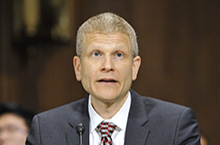Judicial and Media Independence After the Next Attack
With his repeated disparagement of the judiciary and unfounded criticism of the news media for under-reporting terrorist attacks, a number of commentators have suggested that Trump is preemptively trying to shift the blame to the courts and the media in the event that an attack occurs. We agree that this is a concern. Our greater concern, however, is that he may be able to use this blame-shifting narrative to reduce the future checking power of institutions like the judiciary and the media, especially in the wake of a terrorist attack.
Published by The Lawfare Institute
in Cooperation With

With his repeated disparagement of the judiciary and unfounded criticism of the news media for under-reporting terrorist attacks, a number of commentators have suggested that Trump is preemptively trying to shift the blame to the courts and the media in the event that an attack occurs. We agree that this is a concern. Our greater concern, however, is that he may be able to use this blame-shifting narrative to reduce the future checking power of institutions like the judiciary and the media, especially in the wake of a terrorist attack.
At the moment, the judiciary and media are functioning well. But these institutions will inevitably become more vulnerable after an attack, especially a significant attack. Trump has already given specific indications that, in the event of such an attack, he will blame these institutions. For example, he has publicly claimed that because of the recent district court decision stopping enforcement of his immigration order, “many very bad and dangerous people may be pouring into our country” and that the decision “opens up our country to potential terrorists and others that do not have our best interests at heart.” He has also contended that if the government does not win the case, “we can never have the security and safety to which we are entitled.”
It is not a stretch to think that he would attempt to use such a narrative in an effort to rally a fearful public into accepting a disregard of judicial authority or a reduction in freedom of the press. Jack Goldsmith has already speculated that Trump may be trying to lose the pending immigration case in order to help set up such a narrative. While we have some doubts about whether Trump is specifically trying to lose the case, it is at least plausible that he is looking ahead to how he might use a loss to his advantage, especially because it is now obvious that both the courts and the media are likely to be a continuing thorn in his side.
Knowing that Trump may well challenge the authority of the judiciary and the media after an attack, it is important for judges, reporters, and civil society more generally to be braced for it and to be very clear about who bears responsibility for any national security failings. For example, it is obviously Trump’s fault—not the courts’ or the media’s—that his executive order on immigration and refugees was so poorly developed, reviewed, and rolled out. And it is Trump’s fault—not the courts’ or the media’s—that he has made so many bigoted statements about Muslims, which calls the constitutionality of the order into question on establishment clause, free exercise, and equal protection grounds, notwithstanding the President’s ordinarily expansive authority in this area of the law.
To be clear, we do not yet have a situation in which Trump is ordering executive branch officials not to comply with or enforce federal court orders. Nor are we at the point at which Trump is taking affirmative steps to suppress the media. It is essential to avoid hysteria and to avoid turning everything into a purported constitutional crisis. But given Trump’s conduct and statements to date, it is not hysterical to fear non-compliance with, or non-enforcement of, federal court decisions at the direction of the President, or to wonder what he has in store for the news media in the event of a terrorist attack.
The depressing reality is that, even if the President and his advisors were fully competent, there would probably be some terrorist attacks in the United States at some point. It is impossible for any nation to stop every attack, and all the more so when the American people are not prepared (correctly, we think) to tolerate truly draconian infringements of individual liberty. And it is when an attack comes that the institutions that check presidential power, including the federal courts and the news media, will be most vulnerable.
It is especially important to think through how to protect those institutions now, before the next attack, because, at least in its early stages, the Trump administration does not appear to be fully competent (in stark contrast to the three Ninth Circuit judges, Republican and Democratic appointees alike, who were models of professionalism and competence during recent oral arguments on the legality of Trump’s executive order). Security experts who have served in both Republican and Democratic administrations are arguing that Trump’s executive order and anti-Muslim rhetoric will make the United States less safe. The recent gratuitous friction that he seems to have generated with allies like Australia further undermines confidence in the competence of his administration in protecting national security. As Conor Friedersdorf recently wrote in The Atlantic, despite all of his bluster about making the country safe, Trump’s actions and rhetoric to date are likely having the opposite effect.
So, as depressing as it is to contemplate, it is important to start thinking now about how to defend the judiciary and the media after the next attack. As a first step, it is essential to continue resisting any suggestion that, by doing their jobs, these institutions are to blame for the security failings of this administration. Another step would be to give more concrete consideration to the conditions under which attempts to undermine the judiciary or the media should be considered grounds for impeachment. Ideally, the very act of thinking this through and specifying lines that should not be crossed might help stave off potential abuses.






